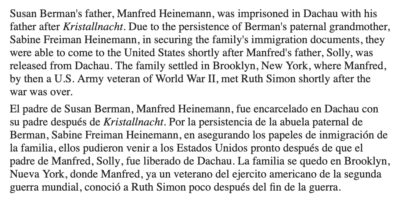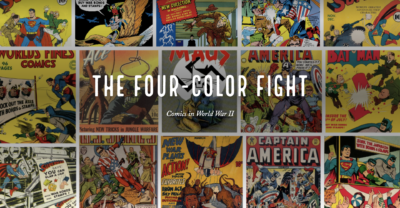Experiencing the pivot: building a virtual internship program (Part II)
10 November 2020 – Adina Langer
Editor’s Note: This post is the second in a series of three describing the experiences of staff and interns participating in a new virtual internship program at the Museum of History and Holocaust Education (MHHE) at Kennesaw State University, created as a response to the COVID-19 pandemic. The first post featured an interview with MHHE internship coordinator Tyler Crafton-Karnes. The content of this post is based on responses to questions posed by MHHE curator Adina Langer to interns Mason Allen, Amy Collerton, Alejandra Gonzalez-Calvo, and Alysa Matsunaga.
Part II
In the spring of 2020, Alejandra Gonzalez-Calvo was a post-baccalaureate student taking classes at Kennesaw State University to enhance her applications to graduate school. She hopes to earn a PhD in Roman Art History and become a professor or work in an archaeological museum. Amy Collerton graduated from Georgia State University in May 2020 with a master’s degree in history and a graduate certificate in heritage preservation with a concentration in public history. Hoping to begin her career right away, she feels that “the COVID-19 pandemic has put a damper on my attempts to find and start my career in historical work.”
Alysa Matsunaga is a junior at the University of Georgia majoring in history and minoring in Japanese language and literature. She is also working toward the university’s certificate in museum studies. She plans to study public history in graduate school. Mason Allen is currently a master’s student in history at the University of Georgia. Previously, he worked as a social studies teacher but was planning to pursue museum work following graduate school.
All four learned about the internship program at the Museum of History and Holocaust Education (MHHE) through their university contacts. The students hoped that the opportunity to get involved would help them further their career goals, even though they were in different places in their educational process.
Collerton had hoped to find a job in heritage preservation or public history in the spring of 2020, but “thanks to the pandemic, those plans are more or less on hold. I’m still looking for a career . . . but the current economic climate is working against me. Since I was facing a tougher than usual job market and a few months of isolation and quarantine, I decided to do what I could with the tools available to me by taking the opportunity to work with the MHHE.”

Alejandra Gonzalez-Calvo, intern for the MHHE, working from home. Photo credit: Alejandra Gonzalez-Calvo.
For Matsunaga, Allen, and Gonzalez-Calvo, the choice to pursue a virtual internship fit more squarely within their summer plans. They all relished the opportunity to participate in museum work from home.
Highlights of the experience varied among the four students. Allen said, “As an educator and historian, I enjoyed creating educational resources for undergraduate students and making the museum experience more accessible during the pandemic.” Gonzalez-Calvo worked on an Adobe Spark page about the MS St. Louis and a series of exhibit translations from English to Spanish. She said, “Creating a product for museum educators to use in classrooms” was a highlight of her experience. She was proud of the visual appeal of her Adobe Spark page. She also enjoyed having the opportunity to translate a Holocaust story from English to Spanish, “which means I’m taking steps toward accessibility, something I value in all fields.”

Alejandra Gonzalez-Calvo, intern for the MHHE, translated stories about the Holocaust from English to Spanish. Image credit: Alejandra Gonzalez-Calvo
Collerton enjoyed “being able to put so many of the lessons and principles I learned during my time in grad school into practice so soon after graduating. Additionally, the professional development opportunities and workshops offered by the MHHE have given unique insights into the inner workings of museums and helped prepare me for one day working in a public history institution or heritage preservation site.” She also appreciated the kindness and helpfulness of the MHHE staff. “The experiences offered by the MHHE’s virtual internship and the subsequent interactions with the staff of the MHHE have been extremely helpful in overcoming both the challenges offered by the internship and the challenges created by the COVID-19 pandemic.” Likewise, Matsunaga appreciated “getting to know the staff of the museum through weekly meetings and interviews, as it would help us network and become knowledgeable of the various careers that help run the museum.”
When asked about challenges they encountered, all four interns highlighted the difficulties of time-management while working from home. To remedy this issue, Matsunaga “set up a schedule that was similar to a 9–5 workday, limiting the time I had to work so I could maintain productivity, while also not overworking myself.” For Allen, “the main challenge for me was simply managing my time. In addition to working as an intern, I was also a graduate teaching assistant for UGA over the summer, so I was grading student work in addition to creating online exhibits. I found a rhythm, though, and my experience with conducting historical research proved valuable in making my time management easier. In a sense, my research experience streamlined the process for me.”
Other challenges were more standard for museum work, regardless of on-site vs. virtual status. For example, Matsunaga noted the challenge of working with sources in multiple languages. “For my module about music during the Holocaust, I had a lot of sources that referenced songs that didn’t have English translations (e.g. the Yiddish song “Huylet, Huylet, Beyze Vintin”). Instead of making assumptions and translating it myself through online sources (which would have resulted in me missing valuable context and misinterpreting the text), I had to reach out to people who knew Yiddish.”

MHHE intern Amy Collerton created an Adobe Spark educational module about comic books in World War II, entitled “The Four Color Fight.”
Gonzalez-Calvo also encountered difficulties related to translation. “I grew up speaking both English and Spanish, but I went to school mostly in English only, so I don’t have all the Holocaust vocabulary in Spanish. Also, not everything translates perfectly from one language to the other, so finding workarounds has been crucial.”
Collerton encountered another linguistic challenge common to museum work. Working on an Adobe Spark educational module about comic books during World War II involved a subject with which Collerton had a great deal of expertise, “so condensing the enormity of that subject into something that university-level students would be comfortable exploring was the first challenge I encountered.”
~The Museum of History and Holocaust Education (MHHE) at Kennesaw State University presents public events, exhibits, and educational resources focused on World War II and the Holocaust in an effort to promote education and dialogue about the past and its significance today.



